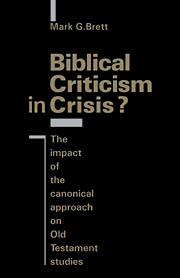Book contents
- Frontmatter
- Contents
- Acknowledgements
- List of abbreviations
- Introduction: Setting the scene
- 1 Distinguishing interpretative interests
- 2 The development of canonical exegesis
- 3 ‘Introduction’ and Old Testament theology
- 4 Has Childs fallen into Gabler's ditch?
- 5 Textual intentions and histories of reception
- 6 The future of the canonical approach
- Notes
- Bibliography
- Bibliographical key to the works of Brevard S. Childs
- Index of Old Testament references
- Index of subjects
- Index of authors
3 - ‘Introduction’ and Old Testament theology
Published online by Cambridge University Press: 10 October 2009
- Frontmatter
- Contents
- Acknowledgements
- List of abbreviations
- Introduction: Setting the scene
- 1 Distinguishing interpretative interests
- 2 The development of canonical exegesis
- 3 ‘Introduction’ and Old Testament theology
- 4 Has Childs fallen into Gabler's ditch?
- 5 Textual intentions and histories of reception
- 6 The future of the canonical approach
- Notes
- Bibliography
- Bibliographical key to the works of Brevard S. Childs
- Index of Old Testament references
- Index of subjects
- Index of authors
Summary
THE DISCIPLINE OF INTRODUCTIONS
Five years after the appearance of the Exodus commentary, Childs published his influential Introduction to the Old Testament as Scripture (1979). His unpublished Sprunt Lectures of 1972, which had emphasized final form studies for the first time, were also reworked into this text (1979: 17). The first issue to be considered is whether, as some have suggested, the Introduction reflects any changes in the canonical approach. Second, I will describe the distinctive features of a canonical ‘introduction’ as opposed to earlier scholarly works in this genre. Third, we shall investigate the relationship between Childs's Old Testament Theology in a Canonical Context (1985) and his previous publications.
Changes in the canonical approach
Up until the appearance of the Introduction Childs had consistently stressed that consideration of the New Testament was an essential part of his approach. Yet, as James Barr has correctly pointed out, there is comparatively little talk of the New Testament in the Introduction: ‘the Old Testament has not been interpreted as Christian scripture after all’. Childs's response to this observation was thin. He protested that he ‘was not writing a biblical theology but an introduction to the Hebrew Scriptures … the larger task clearly needs to be done’ (1984b: 70; cf. 1979: 72). He had, however, already written in his Exodus commentary that the sections on ‘New Testament context’ and ‘theological reflection within the context of the Christian canon’ belonged to ‘the heart’ of the commentary (1974a: xvi). Barr had good grounds to think that New Testament study was an indispensable part of the canonical approach.
- Type
- Chapter
- Information
- Biblical Criticism in Crisis?The Impact of the Canonical Approach on Old Testament Studies, pp. 58 - 75Publisher: Cambridge University PressPrint publication year: 1991



